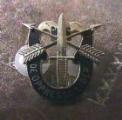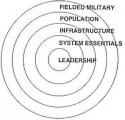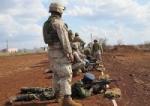A strategic Mobile Defense equivalent for COIN
I read Manstein's "Verlorene Siege" recently. He's recognized as one of the greatest generals of WW2 and wrote that book in the 50's.
One of the interesting parts of that book was a repeated side-note; an accusation at WW2 generals that they failed to break the trench war pattern by voluntarily sacrifice ground to resume mobile warfare once the enemy advances into the widened neutral ground.
That fits pretty well to his WW2 operational concept "Schlagen aus der Nachhand" (Mobile Defense) which allowed the enemy to go beyond the Clausewitzian "Kulminationspunkt" (culminating point) before a decisive counter-attack destroys the attacking armies.
It requires a great deal of patience, discipline and military understanding by the politicians (Hitler most often lacked that) to allow the generals to use such a devastatingly effective operational plan.
I believe that I found a modern-time parallel for COIN.
The low level of Guerrilla combat in Iraq seems to me to be at least in part due to the overwhelming combat effectiveness of the occupation forces. The deterrence is so strong that the classic Maoist Guerrilla warfare stage of open confrontation was never really attempted. There were some major fights as in Fallujah, but those were in their size rather reminiscent of the numerous combat actions in Vietnam than Vietcong's all-out Tet offensive or Castro's drive to Havanna.
The parallel is probably not yet clear: Imagine the counter-Guerrilla parties would be able to provoke a general, decisive uprising that could be defeated conventionally and decisively.
The Vietcong didn't recover from the Tet offensive - regular Northern Vietnamese troops did most of the fighting afterwards.
To provoke such a large-scale open uprising would require less, not more military power in the country (but availability of quick strategic reinforcements).
The counter-Guerrilla forces would need to give up some strength and ground first and to deceive the Guerrillas about the relative physical and morale strengths.
That's certainly a risk; to give up some strength and ground to entice the enemy into an extremely vulnerable action to defeat him decisively.
To give provoke a risky Guerrilla offensive by intentionally giving up some control and strength could be a counter-Guerrilla strategy, resembling the extremely demanding operational concept of mobile defense / "Schlagen aus der Nachhand".
It might work in Afghanistan.













Bookmarks